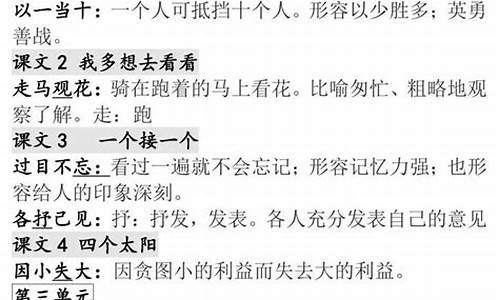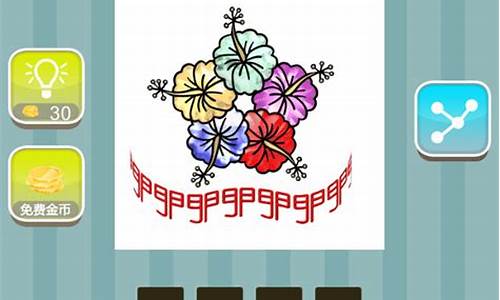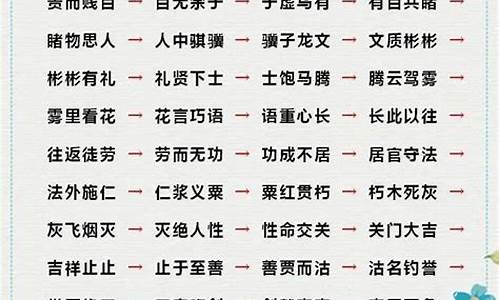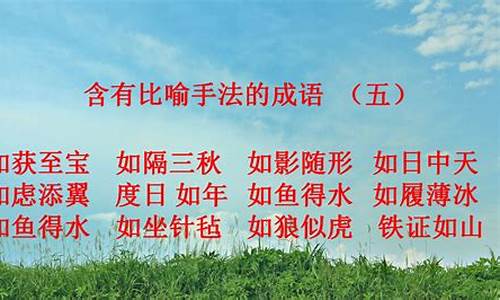您现在的位置是: 首页 > 成语典故大全 成语典故大全
英语成语故事演讲稿三分钟
ysladmin 2024-05-11 人已围观
简介英语成语故事演讲稿三分钟 对于英语成语故事演讲稿三分钟的问题,我有些许经验和知识储备。希望我的回答能够为您提供一些启示和帮助。1.英语写成语故事2.用英语写一个成语故事3.8年级英语关于成语故事的作文30词4.用小学英语表示一个成语故事5.急求一
对于英语成语故事演讲稿三分钟的问题,我有些许经验和知识储备。希望我的回答能够为您提供一些启示和帮助。
1.英语写成语故事
2.用英语写一个成语故事
3.8年级英语关于成语故事的作文30词
4.用小学英语表示一个成语故事
5.急求一个英语的成语故事!!!
6.求四个字的成语故事英语的

英语写成语故事
一言九鼎战国时,秦国的军队团团包围了赵国的都城邯郸,形势十分危急,赵国国君孝成王派平原君到楚国去求援。平原打算带领20名门客前去完成这项使命,已挑了十九名,尚少一个定不下来。这时,毛遂自告奋勇提出要去,平原君半信半疑,勉强带着他一起前往楚国。
平原君到了楚国后,立即与楚王谈及“援赵”之事,谈了半天也毫无结果。这时,毛遂对楚王说:“我们今天来请你派援兵,你一言不发,可你别忘了,楚国虽然兵多地大,却连连吃败仗,连国都也丢掉了,依我看,楚国比赵国更需要联合起来抗秦呀!”毛遂的一席话说得楚王口服心服,立即答应出兵援赵。
平原君回到赵国后感慨地说:“毛先生一至楚,而使楚重于九鼎大吕The warring states, qin army surround the zhao4 guo2's nagara handan, the situation was very urgent, zhao monarch king appointed plain gentleman filial piety to go begging. To chu Plain going to lead 20 to finish the mission, and, MenKe already picked the nineteenth, still less a name shall not come down. At this time, MAO hence proposed to go, plain herassessment salt, reluctantly prince took him went to chu. Plain gentleman to chu immediately after the king talked with the assistance zhao ", talked about the along while also no results. At this time, for the king hair wait, said: "we come here today you send reinforcements, you say, you don't forget, chu although soldiers much bigger, but repeatedly defeats, even countries and lost, in my opinion, chu need more than zhao4 guo2's combined resistance to qin!" Hair wait goes speak oral needs, immediately promised king mullen aassistance zhao. Plain gentleman zhao4 guo2's back after regrets ground say: "hair sir, which enables one to chu chu heavier than the nine tripods big lu."
用英语写一个成语故事
一.刻舟求剑Making His Mark A man from the state of Chu was crossing a river. In the boat, his sword fell into the water. Immediately he made a mark on the boat. "This is where my sword fell off," he said. When the boat stopped moving, he went into the water to look for his sword at the place where he had marked the boat. The boat had moved but the sword had not. Is this not a very foolish way to look for a sword? 战国时,楚国有个人坐船渡江。船到江心,他一不小心。把随身携带的一把宝剑掉落江中。他马上掏出一把小刀,在船舷上刻上一个记号,说:“这是我宝剑落水的地方,所以我要刻上一个记号。” 船靠岸后,那楚人立即从船上刻记号的地方跳下水去捞取掉落的宝剑。捞了半天,仍不见宝剑的影子。其实他又怎么找得到宝剑呢?船继续行驶,而宝剑却不会再移动。像他这样去找剑,真是太愚蠢可笑了。 二 守株待兔Staying by a Stump Waiting for More Hares To Come and Dash Themselves Against It Staying by a Stump Waiting for More Hares To Come and Dash Themselves Against It This story took place more than 2,000 years ago,in the Warring States period(475-221 B.C.).Tradition has it that in the State of Song at that time there was a man who was famous for staying by a stump waiting for more hares to come and dash themselves against it. He was a yong farmer,and his family had been farmers for generations.Year after year and generation after generation, farmers used to sow in spring and harvest in autumn,beginning to work at sunrise and retiring at sunset.In good harvest years,they could only have enough food to eat and enough clothing to wear.If there was a famine due to crop failure,they had to go hungry. This young farmer wanted to improve his life.But he was too lazy and too cowardly.Being lazy and cowardly over everything,he often dreamed of having unexpected blessings. A miracle took place at last. One day in late autumn,when he was ploughing in the field,two groups of people were hunting nearby.As shoutings were rising one after another,scared hares were running desperately.Suddenly,a blind hare dashed itself headlong against the stump of a dead tree in his field and died. That day,he ate his fill. From that day on,he no longer went in for farming again.From morning till night,he stayed by that miraculous stump,waiting for miracles to take place again. This story comes from"The Five Vermin"in The Works of Han Feizi.Later generations often use the set phrase"staying by a stump waiting for more hares to come and dash themselves against it"to show grusting to chance and windfalls or dreaming to reap without sowing.It is also used to show adhering to narrow experiences and not being able to be flexible. 相传在战国时代宋国,有一个农民,日出而作,日入而息.遇到好年景,也不过刚刚吃饱穿暖;一遇灾荒,可就要忍饥挨饿了.他想改善生活,但他太懒,胆子又特小,干什么都是又懒又怕,总想碰到送上门来的意外之财。 奇迹终于发生了。深秋的一天,他正在田里耕地,周围有人在打猎。吆喝之声四处起伏,受惊的小野兽没命的奔跑。突然, 有一只兔子,不偏不倚,一头撞死在他田边的树根上。 当天,他美美地饱餐了一顿。 从此,他便不再种地。一天到晚,守着那神奇的树根,等着奇迹的出现。 成语“守株待兔”,比喻亡想不劳而得,或死守狭隘的经验,不知变通。 "An illusory snake in a goblet" is used to describe the psychological state of being frightened caused by taking illusions as reality. “杯弓蛇影”比喻把虚幻当作真实的恐惧心理。 ------------------------------------------------------- In Jin Dynasty there was a man named Yue Guang who was fond of drinking alcohol. 晋朝有个叫乐(yuè)广的人,爱喝酒。 One day, he invited a friend to his house to drink together. 一天,他邀请朋友到家里来对斟(zhēn)对饮。 Suddenly, his friend saw the reflection of a snack swimming in the goblet. 忽然,朋友看见酒杯里有条蛇影在游动。 He got so much frightened that he took ill on bed after getting home. 他受了惊吓,回去便一病不起。 And neither any doctor or any medicine could cure his illness. 请医服药,都无起色。 Yue Guang came to see him and asked about the cause of his disease. 乐广跑来看他,问明起病的缘由。 When he got to know the cause, he pulled his friend from the bed immdiately and took him to his house. 乐广听后一把拉起朋友往家走。 Yue Guang made his friend sit where he used to, pouring a goblet of alcohol for him, and asked him," Is there any snake reflection in the goblet?" 他让朋友坐在原处,斟满酒问:“有蛇影吗?” There was still a "snake reflection" in the goblet! Yue casually took away the bow hanging on the wall. 杯子里还有“蛇影”!乐广随手取下墙上的弓。 This time, the "snake reflection" disappeared. 这次,“蛇影”不见了! "So it was the bow reflection that was in the goblet!" His friend at once got well from his illness. “杯子里原来是弓影呀!”朋友的病情顿时好了! 天衣无缝 There was a man called Guo Han in the Tang Dynasty(618-907).One summer night, when the moon was very bright he suddenly saw a girl descending slowly from the sky. He observed the girl closely, and found that the dress she was wearing was seamless. He was puzzled, and asked why. The girl answered,"Heavenly clothes are not sewn with needle and thread." This idiom is used metaphorically to indicate the flawless handling of things. It can also be used to indicate a perfectly written poem or other literary article. 唐朝有个人教郭翰。一个夏天的晚上,月光非常明亮,他忽然看见天空中有个女子轻盈而缓慢地飘落下来。他仔细地观察那个女子,发现她身上穿的衣服连一条缝也没有,感到非常奇怪,便问那个女子。女子回答说:“天衣本来就用不着针线缝合的呀!” 这个成语用来比喻处理事情十分周密,不露一点痕迹。也比喻诗文写得很精辟,找不出一点毛病。 一丘之貉 In the Han Dynasty, there was an official called Yang Yun who was both capable and honest. Commenting on the assassination of a king of a small state, he said, “If a king refuses to follow the advice of a wise minister, he will suffer an unitimely death. The emperor of the Qin Dynasty trusted treacherous ministers, and therefore lost his state.” He compared kings and emperors to racoons living on the same mountain. This idiom refers derogatorily to people who are of the same kind. 汉朝时,有个叫杨恽的人,在朝廷做官,廉洁无私,有很有才能。有一次,他听说一个小国王被杀死,就发表议论说:“君王不采纳贤臣的计策,就会得到这种下场。秦朝皇帝宠信奸臣,所以亡国;如果重用贤臣,他的国家就不会灭亡了。”他最后总结说,古今的帝王都不过是一个山丘上的貉而已。 这个成语比喻某些人彼此相同,或者都是坏人。 黔驴技穷 从前,贵州没有驴子,有人从外地带回一头驴子,拴在山下,一只老虎看到了,以为是什么怪物,急忙躲到树林中去头头地瞧。驴子大叫一声,老虎吓了一跳,以为驴子要吃掉自己。时间一长,老虎觉得驴子没有什么恶意,逐渐走近去戏弄它,触犯它。驴子生气了,用蹄子踢老虎。老虎心里想:“你的本领不过就是如此啊!”于是立刻扑过去,一口把它咬死吃掉了。 这个成语比喻仅有的一点本事也用完了,在没有别的办法了。 The Guizhou Donkey Has Exhausted It's Tricks In ancient times there were no donkeys in Guizhou province. Somebody brought a donkey from somewhere and tied it to a tree at the foot of a mountain. A tiger saw the donkey, and thought that it must be a fearsome monster. It hide behind a tree and spied on the donkey. When the donkey brayed, the tiger was frightened, thinking that the donkey was about to devour it. After a while, seeing that the donkey had not moved, the tiger approached it and teased it. The donkey became angry, and kicked the tiger. The tiger thought to itself:"It then all it is capable of?" It then jumped on the donkey and ate it. This idiom is used to mean that one has exhauseted one's skills.
8年级英语关于成语故事的作文30词
Enjoy a story
A big tiger caught a fox in a forest. When the tiger wanted to eat it, the fox said, “You mustn't eat me. I was sent by Heaven to rule the animals. By eating me, you will violate(违抗)the command of Heaven. If you don't believe me, just follow me to see whether the animals are afraid of me.” The tiger agreed, and followed the fox as it walked around the forest. The animals all ran away on seeing them. The tiger thought they were afraid of the fox, so he let it go. He didn't realize that it was him that the beasts(百兽)were really afraid of.
成语为: 狐假虎威
用小学英语表示一个成语故事
Once upon a time,there was a shepherd who kept some sheep.He herded them outside in daytime;at night,he drived them in the sheepfold which was inclosed by hays and pegs etc.
One morning,the shepherd went to herd sheep and found one sheep lost.He then discovered that the sheepfold had been broken,and the wolf must had thieved the sheep through the hollow.
急求一个英语的成语故事!!!
守株待兔
One day a farmer was working in the field .
suddenly a hare carched
into a tree ,it fell to the
ground and died.The
farmer was happy.
He took it back home
and cooked it.from the
on ,the farmer stopped
working.And waited for
another hare.But another hare never come.So the farmer had
nothing to eat.
求四个字的成语故事英语的
1.An Apple of Discord争斗之源;不和之因;祸根
An Apple of Discord直译为“纠纷的苹果”,出自荷马史诗Iliad中的希腊神话故事
传说希腊阿耳戈英雄(Argonaut)珀琉斯(Peleus)和爱琴海海神涅柔斯的女儿西蒂斯(Thetis)在珀利翁山举行婚礼,大摆宴席。他们邀请了奥林匹斯上(Olympus)的诸神参加喜筵,不知是有意还是无心,惟独没有邀请掌管争执的女神厄里斯(Eris)。这位女神恼羞成怒,决定在这次喜筵上制造不和。于是,她不请自来,并悄悄在筵席上放了一个金苹果,上面镌刻着“属于最美者”几个字。天后赫拉(Hera),智慧女神雅典娜(Athena)、爱与美之神阿芙罗狄蒂(Aphrodite),都自以为最美,应得金苹果,获得“最美者”称号。她们争执不下,闹到众神之父宙斯(Zeus)那里,但宙斯碍于难言之隐,不愿偏袒任何一方,就要她们去找特洛伊的王子帕里斯(Paris)评判。三位女神为了获得金苹果,都各自私许帕里斯以某种好处:赫拉许给他以广袤国土和掌握富饶财宝的权利,雅典娜许以文武全才和胜利的荣誉,阿芙罗狄蒂则许他成为世界上最美艳女子的丈夫。年青的帕里斯在富贵、荣誉和美女之间选择了后者,便把金苹果判给爱与美之神。为此,赫拉和雅典娜怀恨帕里斯,连带也憎恨整个特洛伊人。后来阿芙罗狄蒂为了履行诺言,帮助帕里斯拐走了斯巴达国王墨涅俄斯的王后---绝世美女海伦(Helen),从而引起了历时10年的特洛伊战争。不和女神厄里斯丢下的那个苹果,不仅成了天上3位女神之间不和的根源,而且也成为了人间2个民族之间战争的起因。因此,在英语中产生了an apple of discord这个成语,常用来比喻any subject of disagreement and contention;the root of the trouble;dispute等意义
这个成语最初为公元2世纪时的古罗马历史学家马克·朱里·尤斯丁(Marcus Juninus Justinus)所使用,后来广泛的流传到欧洲许多语言中去,成为了一个国际性成语。
eg: He throwing us an apple of discord,we soon quarrelled again.
The dispute about inheriting estate formed an apple of discord between them.
This problem seems to be an apple of discord between the Soviet union and the USA.
2.The Heel of Achilles 亦作The Achilles' Heel唯一弱点;薄弱环节;要害
The Heel of Achilles直译是“阿基里斯的脚踵”,是个在欧洲广泛流行的国际性成语。它源自荷马史诗Iliad中的希腊神话故事。
阿基里斯是希腊联军里最英勇善战的骁将,也是荷马史诗Iliad里的主要人物之一。传说他是希腊密耳弥多涅斯人的国王珀琉斯和海神的女儿西蒂斯所生的儿子。阿基里斯瓜瓜坠地以后,母亲想使儿子健壮永生,把他放在火里锻炼,又捏着他的脚踵倒浸在冥河(Styx)圣水里浸泡。因此阿基里斯浑身象钢筋铁骨,刀枪不入,只有脚踵部位被母亲的手捏住,没有沾到冥河圣水,成为他的唯一要害。在特洛伊战争中,阿基里斯骁勇无敌,所向披靡,杀死了特洛伊主将,著名英雄赫克托耳(Hector),而特洛伊的任何武器都无法伤害他的身躯。后来,太阳神阿波罗(Apollo)把阿基里斯的弱点告诉了特洛伊王子帕里斯,阿基里斯终于被帕里斯诱到城门口,用暗箭射中他的脚踵,负伤而死。
因此,the heel of Achilles,也称the Achilles' heel,常用以表示a weak point in something that is otherwise without fault;the weakest spot等意思。
eg:The shortage of fortitude is his heel of Achilles.
His Achilles' heel was his pride--he would get very angry if anyone criticized his work.
3.Helen of Troy
Helen of Troy 直译"特洛伊的海伦",源自源自荷马史诗Iliad中的希腊神话故事。
Helen是希腊的绝世佳人,美艳无比,嫁给希腊南部邦城斯巴达国王墨涅俄斯(Menelaus)为妻。后来,特洛伊王子帕里斯奉命出事希腊,在斯巴达国王那里做客,他在爱与美之神阿芙罗狄蒂的帮助下,趁着墨涅俄斯外出之际,诱走海伦,还带走了很多财宝
此事激起了希腊各部族的公愤,墨涅俄斯发誓说,宁死也要夺回海轮,报仇雪恨。为此,在希腊各城邦英雄的赞助下,调集十万大军和1180条战船,组成了希腊联军,公推墨涅俄斯的哥哥阿枷门农(Agamemnon)为联军统帅,浩浩荡荡,跨海东征,攻打特洛伊城,企图用武力夺回海轮。双方大战10年,死伤无数,许多英雄战死在沙场。甚至连奥林匹斯山的众神也分成2个阵营,有些支持希腊人,有些帮助特洛伊人,,彼此展开了一场持久的恶斗。最后希腊联军采用足智多谋的奥德修斯(Odusseus)的“木马计”,里应外合才攻陷了特洛伊。希腊人进城后,大肆杀戮,帕里斯王子也被杀死,特洛伊的妇女、儿童全部沦为奴隶。特洛伊城被掠夺一空,烧成了一片灰烬。战争结实后,希腊将士带着大量战利品回到希腊,墨涅俄斯抢回了美貌的海轮重返故土。这就是特洛伊战争的起因和结局。正是由于海轮,使特洛伊遭到毁灭的悲剧,真所谓“倾国倾城”,由此产生了Helen of Troy这个成语。
特洛伊战争的真实性,已为19世纪德国考古学家谢里曼在迈锡尼发掘和考证古代特洛伊古城废墟所证实。至于特洛伊城被毁的真正原因,虽然众说纷纭,但肯定决不是为了一个美女而爆发这场战争的,与其说是为了争夺海轮而打了起来,毋宁说是为了争夺该地区的商业霸权和抢劫财宝而引起战争的。所谓“特洛伊的海伦”,实质上是财富和商业霸权的化身。中国历史上也有过“妲己亡商”,“西施沼吴”等传说,以及唐明皇因宠杨贵妃而招致“安史之乱”,吴三桂“冲冠一怒为红颜”等说法。汉语中有个“倾国倾城”的成语(语出《汉书·外戚传》:‘一顾倾人城,再顾倾人国’。)这里的“倾”字一语双光,既可指美艳非凡,令人倾倒;也可纸倾覆邦国。其含义与Helen of troy十分近似。
在现代英语中,Helen of Troy这个成语,除了表示a beautiful girl or woman;a beauty who ruins her country等意义外,还可以用来表示a terrible disaster brought by sb or sth you like best的意思。
eg:It is unfair that historians always attribute the fall of kingdoms to Helen of Troy.
She didn't think of the beautiful umbrella bought the day before should become a Helen of Troy in her family.Because of this she and her husband quarreled for a long time.
我要读英语作文,麻烦给我找篇关于成语故事的英语短文,短一点的,我是初一的,别太难
英语故事:破镜重圆
A Broken Mirror Joined Together
This set phrase metaphorically means the reunion of husband and wife after an enforced separation or a rupture.
At the end of Southern Dynasties,when the Chen Dynasty was about to be overthrown.
Xú Déyán felt very worried.He foreknew that his wife Princess Lè Chāng was destined to separate from him.
His wife is the last Emperor Chén Shūbǎo's younger sister.
Hence he broke a round bronze mirror into halves.
One half is given to the Princess,the other half left with himself.
The couple agreed on it that the wife would pretend to sell the broked mirror in the street of Cháng'ān,the capital of the Suí Dynasty,on the Lantern Festival.
After the fall of Chén Dynasty,Princess Lè Chāng was captured and sent to Chang'an and forced to be a concubine-servant in the mansion of Yáng Sù.
Xú Déyán missed his wife very much and went to the captial to look for her.
On the 15th day of the first lunar month,he found a man selling half the mirror.
After asking the man,he knew that his wife had been a concubine-servant of Yáng Sù. Thinking that he could not see her again,he sighed a great sorrow.
Having known the matter,Yáng Sù felt much sympathy for the couple.He sent for Xú Déyán and told him to take wife away.Thus the husband and the wife were reunited into a happy couple.
Peaches and Plums Do Not Have to Talk, Yet the World Beats a Path to Them--Natural Attraction(桃李不言,下自成蹊)
Duing the Western Han Dynasty(206 B.C.- A.D.24)Period, there was a very famous general whose name was Li Guang. He was very brave and skillful in battle, and had fought more than seventy battles with the Huns, an ancient nationality in China.Having made brilliant achievements in war, he was deeply loved and esteemed by the officers and men as well as the common people. However,he did not claim credit for himself and become arrogant,although he held a high post,commanding a big army,and had rendered outstanding service in defending the county. He was not only polite and amiable, but also shared weal and woe with the soldiers. He always had the troops under his commandat heart,and whenever gifts were bestowed to him by the imperial government,he distributed the gifts to his officers and men. When marching, he endured the torments of hunger and thirst as the soldiers did when food and water were in short supply. When fighting, he charged at the head of his men,and ,when he gave the order,every soldier advanced bravely to engage in fighting,not fearing death.
When the sad news of the heath of General Li Guang reached the militaty camp,the officers and men of the whole army wept bitterly.
西汉时候,有一位勇猛善战的将军,名叫李广,一生跟匈奴打过七十多次仗,战功卓著,深受官兵和百姓的爱戴。李广虽然身居高位,统领千军万马,而且是捍卫国度的功臣,但他一点也不居功自傲。他不仅待人和睦,还能和士兵同甘共苦。每次朝廷给他的赏赐,他首先想到的是他的部下,就把那些赏赐统统分给官兵们;行军打仗时,遇到粮食或水供给不上的情况,他自己也同士兵们一样忍饥挨饿;打起仗来,他身先士卒,英勇顽强,只要他一声令下,大家个个奋勇杀敌,不握牺牲。这是一位多么让人崇敬的大将军啊!
后来,当李广将军去世的噩耗传到军营时,全军将士无不痛哭流涕,连许多与大将军平时并不熟悉的百姓也纷纭悼念他。在人们心目中,李广将军就是他们崇拜的大好汉。
汉朝伟大的史学家司马迁在为李广立传时称赞道:“桃李不言,下自成蹊。”意思是说,桃李有着芳香的花朵,甜美的果实,虽然它们不会说话,但仍然会吸引人们到树下赏花尝果,以至树下都走出一条小路,李广将军就是以他的真诚和高贵的品质赢得了人们的崇敬。
今天关于“英语成语故事演讲稿三分钟”的探讨就到这里了。希望大家能够更深入地了解“英语成语故事演讲稿三分钟”,并从我的答案中找到一些灵感。








